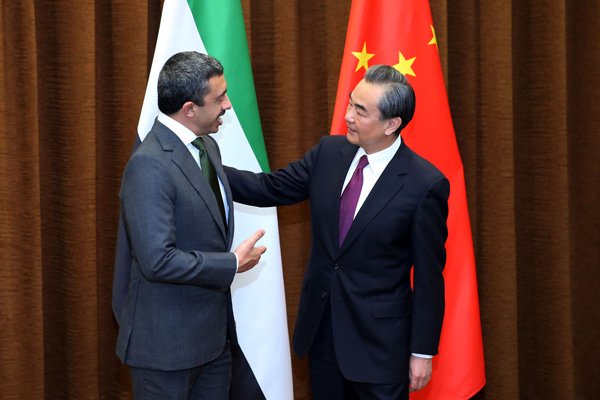
Foreign Minister Wang Yi meets Sheikh Abdullah bin Zayed Al Nahyan, minister of foreign affairs and international cooperation of the United Arab Emirates, in Beijing on May 2. The two co-chaired the first meeting of the China-UAE Intergovernmental Cooperation Committee.[Photo for China Daily]
The United Arab Emirates will never become a safe haven for criminals involved in corruption, Foreign Minister Wang Yi said on May 2 as he described progress on extradition cooperation.
Wang and Sheikh Abdullah bin Zayed Al Nahyan, UAE minister of foreign affairs and international cooperation, co-chaired in Beijing the first meeting of the China-UAE Intergovernmental Cooperation Committee.
“I raised the issue of cooperation in the fight against corruption as well as the pursuit of fugitives and recovery of their assets with Minister Abdullah, and he responded very actively,” Wang said.
“The UAE will never become a safe haven for any corrupt Chinese fugitive,” he added.
Wang said both countries support trade, investment liberalization and facilitation and also advocate open and transparent regional free-trade arrangements.
“We will further step up coordination and cooperation so that we can conclude the substantive negotiations for the China-Gulf Cooperation Council free trade area at an early date,” he said.
Regarding people-to-people exchanges, two-way visits exceeded 600,000 last year.
According to Abdullah, since the UAE implemented a visa-free policy for Chinese citizens in November, the number of Chinese tourists to the country has increased by 7 percent.
“The number of bilateral visits will probably be over 1 million this year and next,” Wang said.
He also said that both countries are satisfied with the achievements in oil cooperation, and will accelerate oil and gas exploration, port construction as well as the development of port industrial parks.
“We also discussed bilateral cooperation in new areas such as nuclear energy and power, and the aerospace industry, which we both believe enjoy broad prospects and huge potential,” he said.
Wang said China remains committed to the stability and development of the Middle East, and China has regarded the UAE as an important partner in maintaining stability in the Gulf region.
“Both sides will work together to push forward a political settlement of regional hot spot issues,” he added.
Abdullah emphasized the UAE’s strong commitment to the one-China policy and said his country looked forward to enhancing the relationship with China in all areas.
Zhu Weilie, an Arabic studies expert at Shanghai International Studies University, said the China-UAE relationship has been on the fast track in recent years, with the two countries working closely in areas such as oil and gas, production capacity and cultural exchanges.
“Since the UAE will host the World Expo in 2020, the Persian Gulf country could also borrow experience from Shanghai,” he said.
